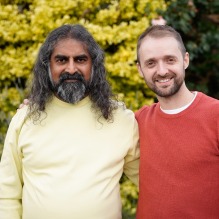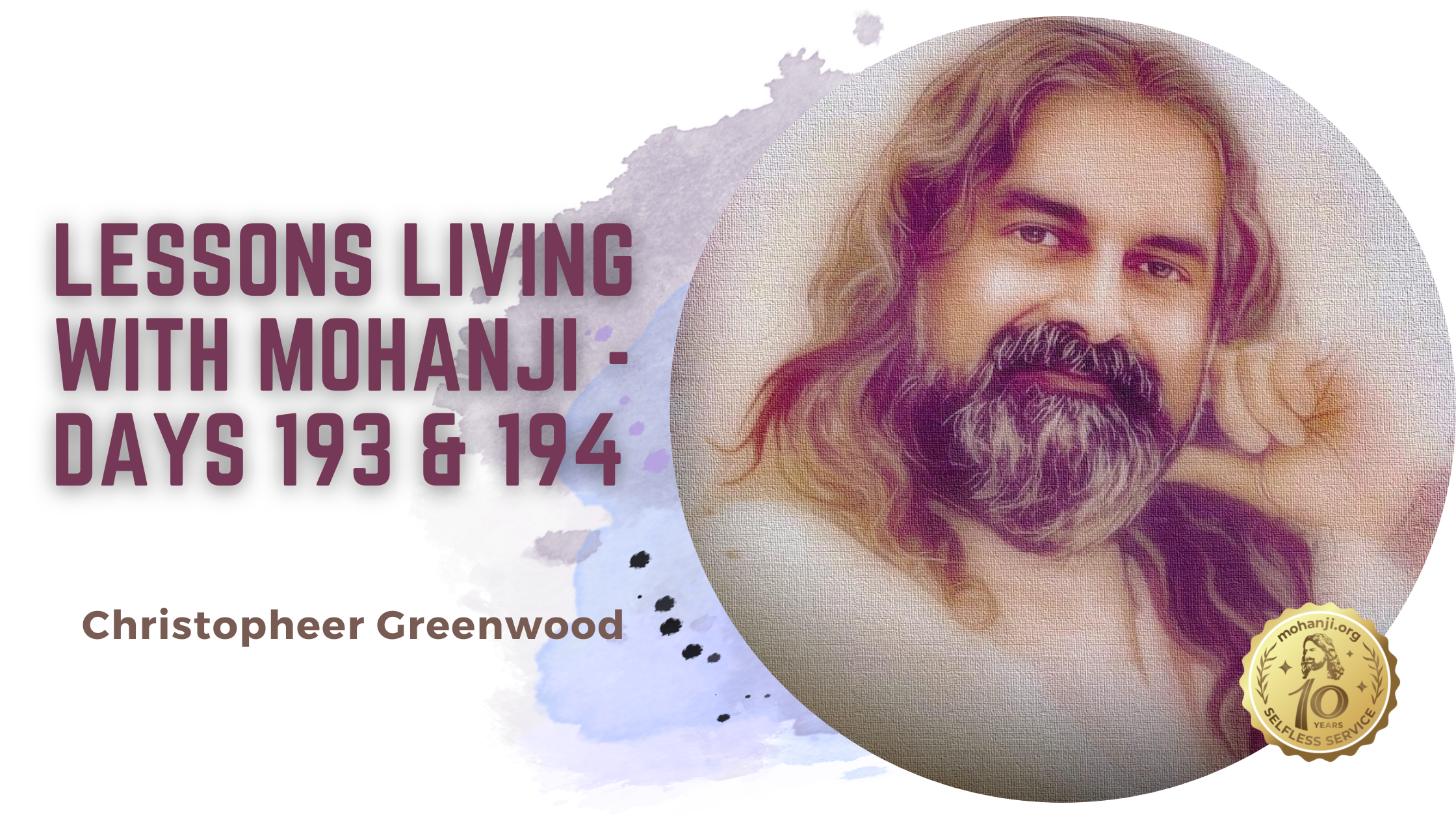by Christopher Greenwood
Day 193 – Learning to Forget
Today, I wanted to talk about one of the simplest lessons, yet one that can also be the hardest; at least, that’s what I found in my experience. This is simply letting go and forgetting any wrongs, injustices, hurts, and all the bad things that people may have done to me throughout my lifetime, the most hurtful or unpleasant experiences in life.
Like many, I’ve experienced them, and although I’ve never really been someone to hold on to a grudge or go to any extremes to seek revenge, those memories would stay, and they would be quite painful. The specifics of those aren’t important, but they mainly involved relationships, family, work, or something unpleasant that had happened to me. But after being with Mohanji and learning from him, and observing him, my perspective on forgiveness has completely changed.
Now, I have more appreciation for the power of forgetting. Once I began to forget these events, “Okay, I recognise that this happened; this was the situation…” it brought the awareness that I’ll never truly know why that event occurred. I’d have my perspective, I’d have my view, based on my experience, but I would never understand the full picture, the full past of what brought that event to life, but there was no need to carry it either; completely letting go meant that I felt light inside.
There are some great meditations and processes now that are available for this, which really helped that cleansing inside, the inner cleansing, The Power of Purity being one, and the specific forgiveness process is available too.
Also, what is interesting is that I’ve heard Mohanji say that forgiveness itself can actually be a subtle mind game. Almost a subtle play of the ego because who are we to actually forgive? We make statements like, “Okay, I forgive this person; it’s okay. I’m happy now; I’ve forgiven them, I held on this long, but now I forgive.” But really, what’s happening in that situation is that nothing has changed the event that took place, but you’ve created some sort of satisfaction because you’ve come to a point where you are saying, “I am now forgiving,” which has an element of the ego and ownership of the situation. But forgetting generally, Mohanji said, is very important because as we move through life, we can collect and hold on to too many events, emotions, and situations, and these can really bog us down.
He says, in quite a funny way, that we often then become walking trash cans, or we carry so much junk from these events and simply live as a hangover of the past, not knowing what burden we’re carrying. So, simply forgetting has a lot of power. Now, during a recent satsaṅg, somebody asked a very good question; I think in their culture, their language, there’s a phrase, I can’t remember it now, but they actually emphasise the importance of “Don’t forget: A bad situation happens to you, but never forget it”.
We clarified that this has some value or merit in it. It’s not that you’re not forgetting what that person has done or what the event was or what the situation was, and holding on to it. It’s more that you don’t forget the lesson that you need to learn from that. You take the lesson, and you remember that, but you detach from the situation itself.
So, those were some short words on the lesson of forgetting.

Day 194 – Increase Self-dependence
Today, I share a lesson on increasing dependability on ourselves. When you look at what Mohanji has established in the world, he is incredibly impressive, especially when you consider the circumstances that he has had to go through in life, such as the loss of his daughter, being betrayed in business, developing illnesses; essentially, he was reduced to nothing, he had to start again from fresh.
If you look at all the platforms that he has created, these are powerful platforms, a collection of organisations that are serving the world in many diverse ways. Many people have helped him over the years, and he really, truly appreciates everybody’s contribution and what everybody gives to the organisation. But what I see is that it has been his strong willpower and determination that have given life and energy to all of these activities.
When you observe him, you realise that he’s not afraid at all to walk alone because he has done that before and he would happily do it again. It’s not that he doesn’t enjoy the support and the teamwork; he will regularly say, “If we’re going to do something, let’s do it together, let’s walk together. At the same time, if you feel it’s not for you, then no problem, but I’m still walking”. That’s the attitude he has, which means that whilst he appreciates everybody, gives respect to everybody, and gives opportunities to everybody, he’s not dependent on anyone.
That’s a very powerful way to live life. It’s a fierce way to live life, and over time, I’ve been learning this on various levels. In the past, I would be reliant on or have a subtle need for approval or validation for happiness. For example, I’d like to know that I’ve done something well or be recognised or for someone to comment on my work, which I think is natural for most people. But now, living with Mohanji, it’s like living with a mirror, which is showing you all the aspects of myself that I would tend to ignore, or I would tend to push away.
It is not comfortable to confront them. Generally, the action and the behaviours will do everything to highlight those, so you can push through them; it’s not nice. This was one of the subtle dependencies that I realised I had, which was a need for approval or recognition. How did I know that I had that dependency? When I would feel affected if it didn’t come, and with Mohanji, it rarely, if ever, comes, especially for me, and especially if there’s an expectation. If I believe I’ve done something well, and I think there’ll be praise, it won’t come. So, a good job or work completed would often be met with just one word from Mohanji: “Good,” followed by: “Okay, this is what we need to do next.” It’s always on to the next steps.
Another dependency, which has been a really big lesson, is trying to complete the work in the office because it’s great to work together as a team. I really enjoy achieving something as a team. But in the office, it can be a very challenging situation because timelines are very, very, very tight, and the pace is quick, which means the work is dynamic. There’s a pace that has to be achieved, and sometimes, it’s not possible to rely on or be dependent on others to work at that type of speed or have that kind of flexibility. If someone can do it, great, but what we do, and what I’ve learned, is that we should try not to have a dependency on someone. If something’s not happening, then okay, no problem, that’s fine, we’ll find another way, or we’ll find another option or outsource the work. That even applies to my activity; when Mohanji has given me tasks, and if he sees that I can’t do something, it will go to somebody else.
There’s no dependency anywhere, and I include myself in that. The lesson from this is that I find great stability, which comes from an increased self-dependency or self-reliance because it forces a connection to the potential within, and the realisation that there’s always a solution to every situation, and we have the capacity inside and we can expand that capacity too. That’s what’s happening now; I’m exploring and deepening the potential for what is possible, and that is actually fun to explore as well: looking at what I can handle myself.
Not that life has become a solo endeavour, but it has become much smoother and much more free and enjoyable, as the happiness and the corresponding successes are also coming and being developed within. Some of the dependencies that people could think about as well are dependencies on places, materials, and even events.

|| JAI BRAHMARISHI MOHANJI ||
Edited & Published by – Testimonials Team, 29th January 2023
Disclaimer:
The views, opinions, and positions expressed by the authors and those providing comments on these blogs are theirs alone and do not necessarily reflect the views, opinions or positions of Mohanji, Mohanji Foundation, it’s members, employees or any other individual or entity associated with Mohanji or Mohanji Foundation. We make no representations as to accuracy, completeness, timeliness, suitability or validity of any information presented by individual authors and/or commenters on our blogs and will not be liable for any errors, omissions, or delays in this information or any losses, injuries or damages arising from its display or use.
We reserve the right to delete, edit, or alter in any manner we see fit blog entries or comments that we, in our sole discretion, deem to be obscene, offensive, defamatory, threatening, in violation of trademark, copyright or other laws, of an express commercial nature, or otherwise unacceptable.
Mohanji Testimonials team


